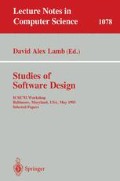Abstract
Software designers compose systems from components written in some programming language. They regularly describe systems using abstract patterns and sophisticated relations among components. However, the configuration tools at their disposal restrict them to composition mechanisms directly supported by the programming language. To remedy this lack of expressiveness, we must elevate the relations among components to first-class entities of the system, entitled to their own specifications and abstractions.
This research was supported by the Carnegie Mellon University School of Computer Science and Software Engineering Institute (which is sponsored by the U.S. Department of Defense) and by a grant from Siemens Corporate Research. The views and conclusions contained in this document are those of the author and should not be interpreted as representing the official policies of any of the sponsors.
Preview
Unable to display preview. Download preview PDF.
References
Robert Allen and David Garlan. Formalizing Architectural Connection. Proc. Sixteenth International Conference on Software Engineering, 1994.
Brian Beach. Connecting Software Components with Declarative Glue. Proc. Fourteenth International Conference on Software Engineering, 1992.
Barry W. Boehm and William L. Scherlis. Megaprogramming. Proc. DARPA Software Technology Conference 1992, pp. 63–82.
Frank DeRemer and Hans H. Kron. Programming-in-the-large versus Programming-in-the-small. IEEE Transactions on Software Engineering, SE-2(2):80–86, June 1976.
David Garlan and Mary Shaw. An Introduction to Software Architecture. In V. Ambriola and G. Tortora (eds), Advances in Software Engineering and Knowledge Engineering, Volume I, World Scientific Publishing Company, 1993.
Dewayne E. Perry and Alexander L. Wolf. Foundations for the Study of Software Architecture. ACM SIGSOFT Software Engineering Notes, vol 17, no 4, October 1992, pp. 40–52.
R. Prieto-Diaz and J. M. Neighbors. Module Interconnection Languages. Journal of Systems and Software vol 6, no 4, November 1986, pp. 307–334.
James Purtilo and Joanne Atlee. Module Reuse by Interface Adaptation. Software: Practice and Experience, 21(6): 539–556, June 1991.
Mary Shaw and David Garlan. Characteristics of Higher-Level Languages for Software Architecture. Unpublished manuscript, 1993.
Gio Wiederhold, Peter Wegner, and Stefano Ceri. Toward Megaprogramming. Stanford University Technical Report STAN-CS-90-1341, 1990.
Gio Wiederhold. Mediators in the Architecture of Future Information Systems. IEEE Computer, 25(3):38–49, March 1992.
Author information
Authors and Affiliations
Editor information
Rights and permissions
Copyright information
© 1996 Springer-Verlag Berlin Heidelberg
About this paper
Cite this paper
Shaw, M. (1996). Procedure calls are the assembly language of software interconnection: Connectors deserve first-class status. In: Lamb, D.A. (eds) Studies of Software Design. WSSD 1993. Lecture Notes in Computer Science, vol 1078. Springer, Berlin, Heidelberg. https://doi.org/10.1007/BFb0030517
Download citation
DOI: https://doi.org/10.1007/BFb0030517
Published:
Publisher Name: Springer, Berlin, Heidelberg
Print ISBN: 978-3-540-61285-8
Online ISBN: 978-3-540-68434-3
eBook Packages: Springer Book Archive

